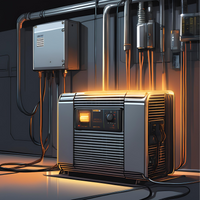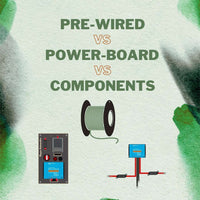Choosing the Right Fuse for Your Campervan's Lithium Battery System
When configuring your campervan's electrical system, especially with substantial lithium battery setups powering high-demand appliances like induction hobs and air fryers, selecting the appropriate overcurrent protection is confusing and crucial for safety and system reliability. It's essential to understand the interrupting capacities of various fuses as these are the key differences between fuses which have the same Amps rating.
Interrupting Capacity Overview
Interrupting capacity refers to the maximum fault current a fuse can safely interrupt without failure. Choosing a fuse with an adequate interrupting capacity ensures that, in the event of a short circuit, the fuse will operate correctly, preventing potential hazards.
Fuse Types and Their Interrupting Capacities
-
MEGA Fuses
-
Interrupting Capacity: Approximately 2,000 amps.
-
Application: Suitable for many applications; however, in large lithium battery systems, a short circuit could produce fault currents exceeding this capacity (e.g., 6,000 amps), the worst case here is the fuse could weld and fail to interrupt the circuit.
-
Marine Rated Battery Fuses (MRBF)
-
Interrupting Capacity: Around 10,000 amps.
-
Application: Designed for demanding environments, MRBFs can handle higher fault currents typical in lithium battery systems, making them a more reliable choice for such applications.
-
Class T Fuses
-
Interrupting Capacity: Up to 20,000 amps.
-
Application: While offering a high interrupting capacity, Class T fuses are generally considered overkill for 12V installations and are more commonly used in larger systems, such as those with 48V batteries.
Battery Management System (BMS) Consideration
It's important to note that while the Battery Management System (BMS) provides primary protection by monitoring and managing battery performance, the fuse serves as secondary protection for the battery and protection for the cables. For cables, Mega fuses are a perfect choice. The BMS is designed to protect against overcharging, over-discharging, and overcurrent situations, but in the event of a severe short circuit, the fuse is a critical safety component.
Recommendation
Given this information, while MEGA fuses have been commonly used and may suffice in most scenarios (such as cable protection), for enhanced safety in large lithium leisure battery systems, it's worth considering upgrading to MRBFs. They offer a higher interrupting capacity, better aligning with the potential fault currents in such setups. Class T fuses, although providing even higher protection, may be unnecessary for typical 12V campervan installations.
Always ensure that your electrical components are appropriately rated for your specific system requirements and consult with a qualified professional if in doubt.
Shop our range of fuses here.








